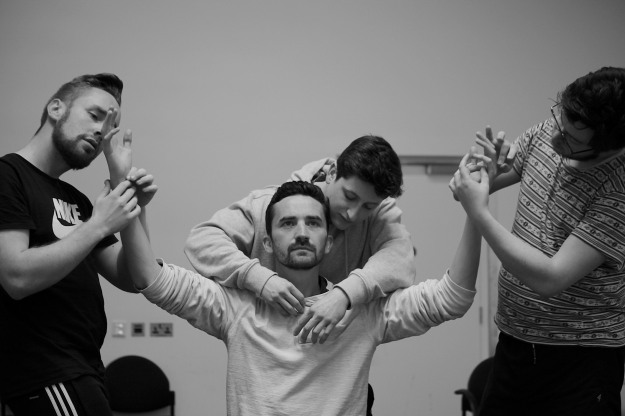 I remember meeting a playwright who came to the university and he told us how a theatre company had asked him to write them a play. He agreed and, on the day he was to start, they brought in a large rock and asked him to use this piece of rock as an inspiration for his play. A tangible, poetic image to start his work, no story, not even an issue. A rock.
I remember meeting a playwright who came to the university and he told us how a theatre company had asked him to write them a play. He agreed and, on the day he was to start, they brought in a large rock and asked him to use this piece of rock as an inspiration for his play. A tangible, poetic image to start his work, no story, not even an issue. A rock.
Anyone who believes the Michael Chekhov technique is only for plays is missing some massive opportunities to use the work and expand and develop devising and adaptation.
I love to use Chekhov technique for adaptation – in this weekend workshop we were using Kafka’s Trial – because it enables you to worry less about narrative and focus in on the essence of what is going on through images and atmosphere ( like the playwright who uses the rock to inspire him). If you do it this way round, if you look for what is going on underneath first, then you will find something which imbues the narrative with a depth you could never have found otherwise. This frightening and rather formless-sounding idea was nonetheless structured in our weekend workshop as I had the group look specifically at two episodes: the beginning and the end.
It is always a good plan to consider the beginning and the end of whatever you are making. It is true you can just ‘wait and see’ but that way the creator can easily get lost. However, if there is a beginning and end, you have a grasp of the piece. It does not mean that you cannot make radical changes, indeed it is right that the end might change, but you have addressed the piece as a whole from early on.
Working with the essentials of radiating/receiving/ease and form/ general atmosphere and working with images, we then began to work on the two episodes, looking for images and atmosphere, which we firstly made into non-narrative pieces. I wanted to encourage the group to resist any temptation to ‘tell the story’ in the initial pieces. This made, in the first piece particularly, a violent animalistic rat-infested world. I then suggested that they looked at the atmosphere of the mundane world of Joseph K and for both groups to explore narrative tableaux. They then started to mesh the two elements, the mundane and the imaginative, of the story and the image, together.
 We then added some text, both narrative and conversational, from the passages I had chosen, building our pieces with several ‘showings’ as we built up the pieces. This was a very supportive and creative group. I am going to run another of these workshops which take first principle elements of Chekhov and a novel.
We then added some text, both narrative and conversational, from the passages I had chosen, building our pieces with several ‘showings’ as we built up the pieces. This was a very supportive and creative group. I am going to run another of these workshops which take first principle elements of Chekhov and a novel.
Next up is Archetypes and Archetypal Atmospheres and as it is Midsummer, we will be working with A Midsummer Night’s Dream, so we will be doing some voice work too. It takes place on June 21-23. There are still places. Email chekhovtrainperformireland@gmail.com to book your place. The Venue is NUI Galway.
